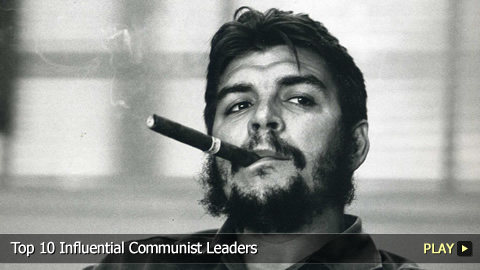Top 10 Influential Communist Leaders

These were the faces of a new political order: there are many figures through history that have furthered the cause of communism, for better or worse. While many of those leaders have been accused of terrible crimes, there's no denying communism around the world would not be the same without them. In remembrance of Fidel Castro's December 2nd, 1961 speech wherein he declared that Cuba was to adopt Communism, http://www.WatchMojo.com counts down our picks for the top 10 communist leaders. For this list, we looked for political revolutionaries and communist leaders who had a major impact on the emergence and growth of Communist states throughout the world, in the twentieth century.
Top 10 Communist Leaders
These were the faces of a new political order. Welcome to WatchMojo.com, and today we’re counting down our picks for the top 10 communist leaders.
For this list, we looked for political revolutionaries and communist leaders who had a major impact on the emergence and growth of Communist states throughout the world, in the twentieth century.
#10: Che Guevara
(1928-67)
This iconic guerilla revolutionary died for his Marxist ideals. Born in Argentina, Guevara trained as a doctor but turned to social activism after witnessing the brutal living conditions of poor Latin Americans. A political activist in Argentina and Bolivia, Che turned to military action, fighting alongside Fidel Castro in Cuba. As an advisor to Castro’s guerilla army, Che was essential in the establishment of the West’s first communist state.
#9: Nikita Khrushchev
(1894-1971)
After making a splash by denouncing his predecessor, Joseph Stalin, upon gaining power, Khrushchev worked to improve his population’s quality of life, allowing for greater levels of cultural and intellectual freedom. Despite having brought the world to a stand-still during the Cuban Missile Crisis, Khrushchev travelled throughout the world, promoting a policy of co-existence between East and West; a policy that provided a brief “thaw” during the Cold War.
#8: Ho Chi Minh
(1890-1969)
As North Vietnamese President and leader of the country’s Communist Party, Ho fought against French colonial rule and led his people in bloody war with the Americans. After being raised as a Confucian and traveling the world in his youth, Ho embraced socialist ideology as a tool for change. Utilizing communist ideals to embolden a national revolution, Ho united his country and ushered in an era of Vietnamese self-government.
#7: Mikhail Gorbachev
(1931-)
An open critic of his communist predecessors, Gorbachev helped welcome the end of the Cold War and of communism in Eastern Europe. Promoting a more open and economically progressive nation, Gorbachev championed discussion and political debate within Russia and other satellite states. Most significantly, he abolished the Brezhnev Doctrine’s demand for single-party communist states, opening the door for the legalization of unions, various political parties and subsequently free elections.
#6: Fidel Castro
(1926-)
Castro is an iconic figure of the Latin American socialist movement. In the 1950s, he spearheaded a military campaign against the dictator, Fulgencio Batista, with only 81 men. Despite a brutal defeat, Castro continued his fervent military and propaganda campaign and soon, his 800-man guerilla force and Batista’s 30-thousand-man army had their final conflict. Castro emerged the victor, establishing the communist rule in Cuba that remains today.
#5: Leon Trotsky
(1879-1940)
A supporter of Lenin’s radical communist mandate, this spellbinding orator and Marxist champion played a key role in the Bolshevik usurpation of Russian political power. As a Red Army general and phenomenal political strategist, Trotsky made essential contributions to the establishment of Lenin’s leadership in the USSR. Considered Lenin’s obvious successor, Trotsky was outmanoeuvred by Joseph Stalin’s cunning politicking, and was eventually assassinated while living in exile.
#4: Mao Zedong
(1893-1976)
Mao united China’s 550 million inhabitants within one, strong, centralized state. Supported by China’s peasantry, Chairman Mao expelled all foreigners and established a new society along communist lines. Like many other communist dictators, Mao is a divisive figure. Though Mao’s rule saw the death of millions as a result of famine, forced labour and murder, he is credited with establishing China as a major world power.
#3: Joseph Stalin
(1878-1953)
Stalin rose to power by establishing strategic alliances within the Communist Party, and ruthlessly eliminating opposition. As a dictator, he ruled the USSR with an iron fist, industrializing the state through a rigorous top-down consolidation of peasant farms into state-run enterprises and rapidly implementing industrialization countrywide. Though Stalin’s rule over communist Russia was one of the most brutal and bloody ever, he grew the Eastern Bloc to be the only rival in size and stature to the USA’s influence over the Western world.
#2: Karl Marx
(1818-83)
The father of modern socialism, Marx and his partner Friedrich Engel’s “Communist Manifesto” was a powerful critique of modern capitalism, calling for the working class to seize the state, abolish private property and establish socialist societies. Marx’s work had little impact when it was first published; however, with massive economic shifts, brought on by industrialization, Marx became the voice of the working man, inspiring communist revolution first in Europe and later throughout the world.
Before we unveil our number one pick, here are a few honorable mentions:
- Kim il-Sung
- Kim Jong-il
- Josip Broz Tito
#1: Vladimir Lenin
(1870-1924)
Vladimir Ilyich Ulyanov, better known as Lenin, was the driving force behind the Russian Revolution. An unabashed political radical, Lenin called upon Russia’s working class to rise up against the wealthy and establish a socialist society. Offering them “Peace, Bread and Land,” Lenin galvanized the Russian proletariat, spawned a bloody revolution and established the first-ever communist state, with himself as its fearless leader.
Do you agree with our list? Which do you think have been the most influential communist leaders in history? For more historical top 10s published every day, be sure to subscribe to WatchMojo.com.


 2
2
 0
0
 report
report
 1
1
 0
0
 report
report